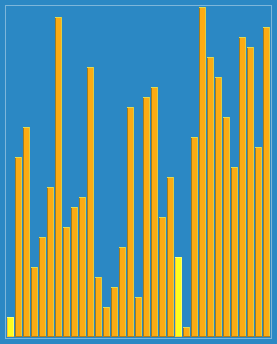Stooge sort
Stooge sort is a recursive sorting algorithm. It is notable for its exceptionally bad time complexity of O(nlog 3 / log 1.5 ) = O(n2.7095...). The running time of the algorithm is thus slower compared to reasonable sorting algorithms, and is slower than Bubble sort, a canonical example of a fairly inefficient sort. It is however more efficient than Slowsort. The name comes from The Three Stooges.[1]
 Visualization of Stooge sort (only shows swaps). | |
| Class | Sorting algorithm |
|---|---|
| Data structure | Array |
| Worst-case performance | O(nlog 3/log 1.5) |
| Worst-case space complexity | O(n) |
The algorithm is defined as follows:
- If the value at the start is larger than the value at the end, swap them.
- If there are 3 or more elements in the list, then:
- Stooge sort the initial 2/3 of the list
- Stooge sort the final 2/3 of the list
- Stooge sort the initial 2/3 of the list again
It is important to get the integer sort size used in the recursive calls by rounding the 2/3 upwards, e.g. rounding 2/3 of 5 should give 4 rather than 3, as otherwise the sort can fail on certain data.
Implementation
function stoogesort(array L, i = 0, j = length(L)-1){
if L[i] > L[j] then
L[i] ↔ L[j]
if (j - i + 1) > 2 then
t = (j - i + 1) / 3
stoogesort(L, i , j-t)
stoogesort(L, i+t, j )
stoogesort(L, i , j-t)
return L
}
gollark: Not now, I mean, later.
gollark: Want a batch of 10 or so?
gollark: I finally brought my 3D printer online and made a few more.
gollark: How do you know he's wyættplayz?
gollark: It was taking too much time or something.
References
- Black, Paul E. "stooge sort". Dictionary of Algorithms and Data Structures. National Institute of Standards and Technology. Retrieved 18 June 2011.
- Cormen, Thomas H.; Leiserson, Charles E.; Rivest, Ronald L.; Stein, Clifford (2001) [1990]. "Problem 7-3". Introduction to Algorithms (2nd ed.). MIT Press and McGraw-Hill. pp. 161–162. ISBN 0-262-03293-7.
External links
This article is issued from Wikipedia. The text is licensed under Creative Commons - Attribution - Sharealike. Additional terms may apply for the media files.